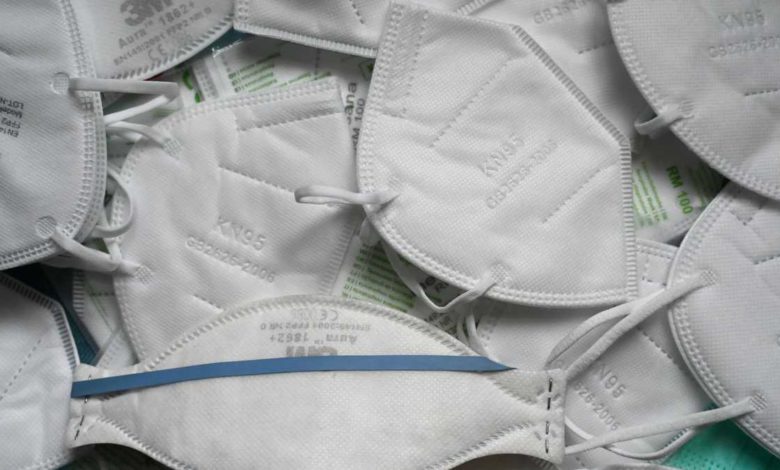

If you're still wearing a cloth or surgical mask when you're out and about, it's time to rethink your face covering.The U.S. Centers for Disease Control and Prevention (CDC) is set to update its mask advice this week to best reflect the available options and the different levels of protection they provide, a CDC official told CNN Tuesday.Many experts say cloth and surgical masks don't provide enough protection, and instead encourage N95 or FFP2 coverings.Upgraded masks are already the norm in much of Europe. Germany mandates FFP2 coverings in stores, on public transport and in other public places. Neighboring Austria made FFP2 masks mandatory outdoors on Tuesday when it is not possible to keep a minimum of 2 meters from people outside one's household, and they have been required indoors since last month.Italy mandated the heavy-duty masks to enter stadiums, museums, cinemas and theaters, and use public transport from December. And in Greece, anyone who has left self-isolation must wear them in any public place for five days.The differing terminology for the masks can be confusing, but all the terms refer to the level of filtration offered by the covering — and there's no doubting that FFP2, N95 or KN95 models offer better protection than those made from cloth or other fabrics.Cloth masks — encouraged earlier in the pandemic — can stop large droplets, while more effective masks can also filter smaller aerosols or particles potentially laden with airborne virus.Properly fitted N95 respirators that are approved by the U.S. National Institute for Occupational Safety & Health can filter up to 95% of particles in the air, according to the CDC. A cloth face covering, by contrast, also has 75% inward and outward leakage, which the American Conference of Governmental Industrial Hygienists defines as the "percentage of particles entering the facepiece" and the "percentage of particles exhaled by a source exiting the facepiece," respectively.People concerned about the best way to protect themselves and their loved ones during this surge of omicron variant cases should "get the highest-quality mask that you can tolerate and that's available to you," Dr. Anthony Fauci, director of the National Institute of Allergy and Infectious Diseases, told CNN's Anderson Cooper on Tuesday, signaling a switch in the official advice.The issue thus far is that filtration masks are generally more expensive, a bit less convenient to wear and earlier in the pandemic they weren't always widely available.That explains why the CDC has until now actively encouraged members of the public against buying N95 masks — currently stating on its website that they should be "prioritized for health care personnel."But Fauci told CNN that "right now, doesn't seem to be any shortage of the masks that some time ago were not available.""What the CDC has said — and it gets misinterpreted — they're saying, wearing any mask is better than no mask at all," Fauci said. "But there is a gradation of capability of preventing you from getting infected and from you transmitting it to someone else. So we should be wearing the best possible masks that we can get. That's a fact."CNN's Nina Avramova contributed reporting
If you're still wearing a cloth or surgical mask when you're out and about, it's time to rethink your face covering.
The U.S. Centers for Disease Control and Prevention (CDC) is set to update its mask advice this week to best reflect the available options and the different levels of protection they provide, a CDC official told CNN Tuesday.
Many experts say cloth and surgical masks don't provide enough protection, and instead encourage N95 or FFP2 coverings.
Upgraded masks are already the norm in much of Europe. Germany mandates FFP2 coverings in stores, on public transport and in other public places. Neighboring Austria made FFP2 masks mandatory outdoors on Tuesday when it is not possible to keep a minimum of 2 meters from people outside one's household, and they have been required indoors since last month.
Italy mandated the heavy-duty masks to enter stadiums, museums, cinemas and theaters, and use public transport from December. And in Greece, anyone who has left self-isolation must wear them in any public place for five days.
The differing terminology for the masks can be confusing, but all the terms refer to the level of filtration offered by the covering — and there's no doubting that FFP2, N95 or KN95 models offer better protection than those made from cloth or other fabrics.
Cloth masks — encouraged earlier in the pandemic — can stop large droplets, while more effective masks can also filter smaller aerosols or particles potentially laden with airborne virus.
Properly fitted N95 respirators that are approved by the U.S. National Institute for Occupational Safety & Health can filter up to 95% of particles in the air, according to the CDC.
A cloth face covering, by contrast, also has 75% inward and outward leakage, which the American Conference of Governmental Industrial Hygienists defines as the "percentage of particles entering the facepiece" and the "percentage of particles exhaled by a source exiting the facepiece," respectively.
People concerned about the best way to protect themselves and their loved ones during this surge of omicron variant cases should "get the highest-quality mask that you can tolerate and that's available to you," Dr. Anthony Fauci, director of the National Institute of Allergy and Infectious Diseases, told CNN's Anderson Cooper on Tuesday, signaling a switch in the official advice.
The issue thus far is that filtration masks are generally more expensive, a bit less convenient to wear and earlier in the pandemic they weren't always widely available.
That explains why the CDC has until now actively encouraged members of the public against buying N95 masks — currently stating on its website that they should be "prioritized for health care personnel."
But Fauci told CNN that "right now, [there] doesn't seem to be any shortage of the masks that some time ago were not available."
"What the CDC has said — and it gets misinterpreted — they're saying, wearing any mask is better than no mask at all," Fauci said. "But there is a gradation of capability of preventing you from getting infected and from you transmitting it to someone else. So we should be wearing the best possible masks that we can get. That's a fact."
CNN's Nina Avramova contributed reporting
Source link









